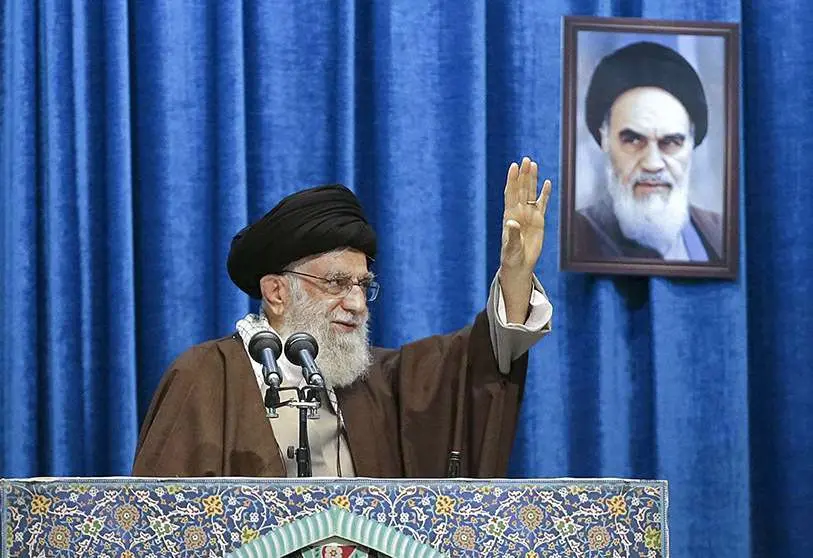Anniversary of Iran's revolution should bring serious Western support for protesters

11 February marks the 44th anniversary of the Iranian revolution. At the time of the Shah's ouster, this revolution was overwhelmingly supported by the Iranian people, who generally believed that it would lead to the advent of democratic governance and civil liberties. There was little warning that Ayatollah Khomeini would derail the populist movement in order to establish himself as the first supreme leader in a system that guaranteed absolute power to Shiite clerics.
Although this system lasted 44 years, it was always deeply unpopular. Grievances against the theocratic regime have continued to proliferate, linked to patterns of repression and corruption that have long since surpassed those of the shah's regime. In recent years, the economic situation has deteriorated to the point where the vast majority of the population lives below the poverty line, while national wealth has become increasingly concentrated in the hands of a small number of entities, most of them wholly owned by or closely affiliated with the Islamic Revolutionary Guard Corps (IRGC).
This hard-line paramilitary was founded shortly after the revolution with the stated aim of safeguarding and exporting the regime's hard-line Islamist principles. In line with its primary mission, the IRGC has leveraged its financial empire to increase the repression of the Iranian people as well as to extend its reach into the surrounding region and the world at large.
Countless Iranian expatriates have called for the IRGC to be recognised as a terrorist entity. Many Iranians will gather in Paris on the anniversary of the revolution to demonstrate for a global ban on the organisation. Organisers of the event, mostly supporters of the People's Mojahedin Organisation of Iran, have described this as the first and most fundamental step towards implementing a more assertive set of policies towards the Islamic Republic as a whole.
Many Western policymakers enthusiastically endorsed the proposals for such a designation, including members of the European Parliament who voted 598 to nine in favour of a non-binding resolution on the matter. But unfortunately, the EU leadership is dragging its feet, with foreign policy chief Josep Borrell even stating publicly that the body does not have the power to impose the terrorist designation until the IRGC has been convicted of terrorism by the judiciary of a member state.
Even if one takes this argument at face value, it should not be difficult to obtain such a decision quickly. The IRGC's terrorist activities are well known around the world, and the organisation itself makes only the most superficial attempts to deny its guilt. Thus, the problem is not the presentation of evidence for a court decision; it is the general lack of political will to pursue such a decision in this place. In other words, Borrell's justification for EU inaction is based solely on pre-existing inaction.
This long-standing hesitancy has contributed to a sense of impunity within the Iranian regime, and particularly within the ranks of the IRGC. Tehran's expectation of Western silence has endangered the lives of dissidents at home and abroad.
The People's Mojahedin Organisation, which has guided many of the recent protests through its network of "resistance units", has reported that more than 750 protesters have been killed by the regime, mainly by the IRGC's Basij militia, since the uprising began in mid-September after the death of 22-year-old Mahsa Amini at the hands of Tehran's "morality police". The dead include more than 70 people under the age of 18. At least 30,000 others have been arrested and more than 100 have already been charged with capital punishment in a system in which the IRGC frequently influences proceedings to secure the harshest possible sentences for "national security" crimes.
So far, four people have been executed in connection with the uprising, and there is good reason to believe that the killings will accelerate unless the protests stop or the international community intervenes to limit the regime's ability to repress its own people. The first alternative seems highly unlikely after more than four months of courageous defiance by ordinary Iranians and organised resistance units. It remains to be seen whether the US and its allies will take action to prevent a massacre.
Their response to the upcoming rally in Paris could be a strong signal in either direction. The Iranian expatriate community will pass on very specific demands for action, including those, such as the proscription of the IRGC, that have already been under consideration by the EU for weeks. If policymakers see fit to take these demands seriously, they should act on them immediately. And if they do, and thus set aside the conciliatory tendencies of the past four decades, then Iran's theocratic dictatorship will not be long for this world.

